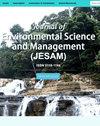Cultural Beliefs, Practices and Productivity of the Fishery Resource in the Island Municipality of Capul, Northern Samar, Philippines
IF 0.3
4区 环境科学与生态学
Q4 ENVIRONMENTAL SCIENCES
引用次数: 3
Abstract
Capul is a small island municipality of Northern Samar situated along the swift flowing San Bernardino Strait. Typhoons often pass through the island especially during the Northeast monsoon season. The inhabitants’ livelihood relies mainly on fishing combined with farming. Unstructured focused interview of the elders of the island on their different cultural beliefs and practices related to fishing was conducted. Fish catch was measured in one lunar month each during summer and typhoon seasons. Catch per unit effort (CPUE) was determined for each major type of fishing method. Multiple correlation analysis was used to determine the factors affecting fish productivity. The islanders still have strong beliefs and respect for deities and fairies supposed to be residing on specific areas of the island. These sacred places remain undisturbed and may have become fish sanctuaries. The inhabitants modified traditional fishing methods to suit their economic needs and condition. People’s initiatives and peer pressure have diminished the use of illegal fishing methods in the island such as compressor, dynamite and poisonous plants. The fishery yield was high in comparison with that of other fishery resources of the country. The CPUE for fish net and hook and line methods were high. The inhabitants’ cultural beliefs and practices may have led to the conservation of their fishery resource which gave the high yield. There are indications that the yield is sustainable.菲律宾萨马尔岛北部卡普尔市渔业资源的文化信仰、实践和生产力
卡普尔是萨马尔北部的一个小岛市,位于湍急的圣贝纳迪诺海峡沿岸。台风经常经过该岛,尤其是在东北季风季节。居民的生活主要依靠捕鱼和务农相结合。对岛上的长者进行了非结构化的重点访谈,了解他们与捕鱼有关的不同文化信仰和做法。在夏季和台风季节,每一个农历月都会测量一次渔获量。为每种主要类型的捕鱼方法确定了单位努力渔获量(CPUE)。采用多元相关分析法确定影响鱼类生产力的因素。岛上居民仍然对居住在岛上特定地区的神和仙女有着强烈的信仰和尊重。这些圣地保持原状,可能已经成为鱼类保护区。居民们改变了传统的捕鱼方法以适应他们的经济需要和条件。人们的倡议和同行的压力减少了岛上非法捕鱼方法的使用,如压缩机、炸药和有毒植物。与该国其他渔业资源相比,渔业产量较高。鱼网法和钩线法的CPUE较高。居民的文化信仰和实践可能导致了对其渔业资源的保护,从而带来了高产量。有迹象表明产量是可持续的。
本文章由计算机程序翻译,如有差异,请以英文原文为准。
求助全文
约1分钟内获得全文
求助全文
来源期刊

Journal of Environmental Science and Management
ENVIRONMENTAL SCIENCES-
CiteScore
0.90
自引率
0.00%
发文量
10
审稿时长
2 months
期刊介绍:
The Journal of Environmental Science and Management (JESAM) is an international scientific journal produced semi-annually by the University of the Philippines Los Baños (UPLB).
JESAM gives particular premium to manuscript submissions that employ integrated methods resulting to analyses that provide new insights in environmental science, particularly in the areas of:
environmental planning and management;
protected areas development, planning, and management;
community-based resources management;
environmental chemistry and toxicology;
environmental restoration;
social theory and environment; and
environmental security and management.
 求助内容:
求助内容: 应助结果提醒方式:
应助结果提醒方式:


